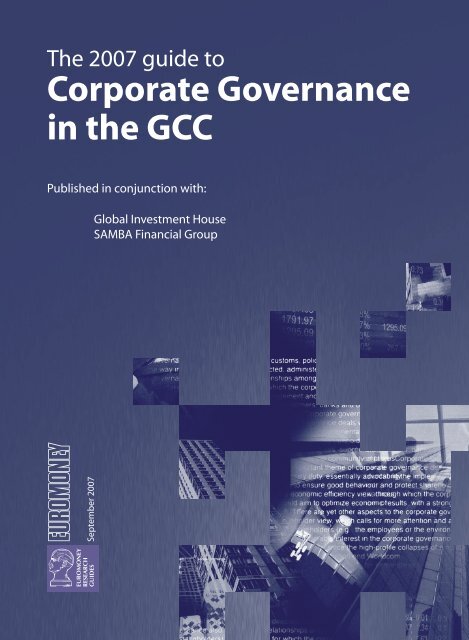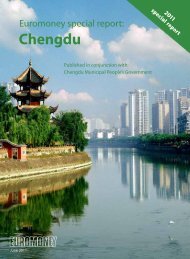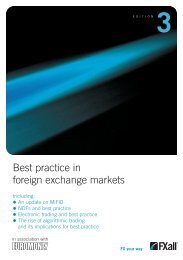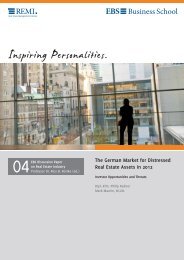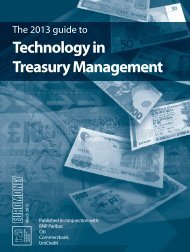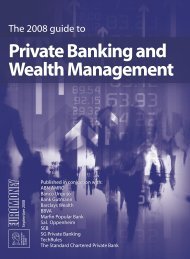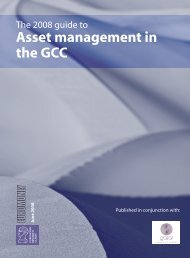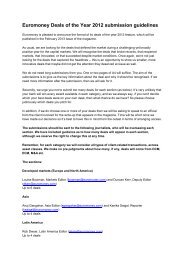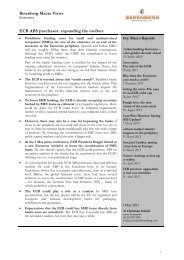Corporate Governance in the GCC - Euromoney
Corporate Governance in the GCC - Euromoney
Corporate Governance in the GCC - Euromoney
- No tags were found...
Create successful ePaper yourself
Turn your PDF publications into a flip-book with our unique Google optimized e-Paper software.
The 2007 guide to<strong>Corporate</strong> <strong>Governance</strong><strong>in</strong> <strong>the</strong> <strong>GCC</strong>Published <strong>in</strong> conjunction with:Global Investment HouseSAMBA F<strong>in</strong>ancial GroupSeptember 2007
Introduction: <strong>the</strong> boomcont<strong>in</strong>uesFollow<strong>in</strong>g several years of explosive growth, <strong>the</strong>re is no sign yet of any deceleration <strong>in</strong> <strong>the</strong> economicboom be<strong>in</strong>g enjoyed by <strong>the</strong> six member states of <strong>the</strong> Gulf Co-Operation Council (<strong>GCC</strong>).Accord<strong>in</strong>g to <strong>the</strong> 2010 Economic Outlook published <strong>in</strong> June 2007 by <strong>the</strong>National Bank of Kuwait (NBK), average real growth <strong>in</strong> <strong>the</strong> <strong>GCC</strong> moderatedto 5.9% <strong>in</strong> 2006, compared with 9.4% <strong>in</strong> 2003, but rema<strong>in</strong>ed “morethan double its average over <strong>the</strong> 80s and 90s.” The current boom, adds<strong>the</strong> NBK analysis, is likely to be susta<strong>in</strong>ed for “at least three more years,”mean<strong>in</strong>g that “<strong>the</strong> expected seven-year run of above average growth willmake it <strong>the</strong> longest expansion <strong>in</strong> three decades.”Beyond <strong>the</strong> headl<strong>in</strong>e growth figures stand a range of dazzl<strong>in</strong>g economic<strong>in</strong>dicators. Accord<strong>in</strong>g to NBK, national <strong>in</strong>come growth averaged“Current account and fiscal surpluses reached 26% and 17% of 2006 GDPrespectively, and are likely to rise fur<strong>the</strong>r if high oil prices are susta<strong>in</strong>ed”19% <strong>in</strong> <strong>the</strong> last four years, driven by a comb<strong>in</strong>ation of “higher oil andnon-oil activity, public spend<strong>in</strong>g and domestic confidence.” Currentaccount and fiscal surpluses reached 26% and 17% of 2006 GDP respectively,and are likely to rise fur<strong>the</strong>r if high oil prices are susta<strong>in</strong>ed.Those surpluses are lead<strong>in</strong>g to <strong>the</strong> accumulation of immense volumesof excess liquidity both <strong>in</strong> <strong>the</strong> public and <strong>the</strong> private sector, andamong consumers throughout <strong>the</strong> Gulf. NBK’s review notes that <strong>in</strong>spite of massive spend<strong>in</strong>g on projects, <strong>GCC</strong> governments have addedalmost $500bn to <strong>the</strong>ir net foreign assets over <strong>the</strong> last four years,which is enough to susta<strong>in</strong> spend<strong>in</strong>g growth for many years. At <strong>the</strong>same time, <strong>the</strong> ongo<strong>in</strong>g <strong>in</strong>vestment boom <strong>in</strong> <strong>the</strong> region, with some$1.25 trillion earmarked for public and private projects, is cont<strong>in</strong>u<strong>in</strong>gto propel growth <strong>in</strong> <strong>the</strong> private sector. Complet<strong>in</strong>g <strong>the</strong> virtuous circle,purchas<strong>in</strong>g power is sharply higher, with per capita GDP hav<strong>in</strong>g postedan annual average growth rate of 15% over <strong>the</strong> last four years <strong>in</strong>spite of mount<strong>in</strong>g <strong>in</strong>flationary pressures. That purchas<strong>in</strong>g power, addsNBK, has been complemented by <strong>the</strong> build-up <strong>in</strong> private wealth from<strong>the</strong> recent equity bull run and from <strong>the</strong> buoyant real estate market.The cont<strong>in</strong>ued surge <strong>in</strong> economic growth and <strong>the</strong> colossal wealth itis creat<strong>in</strong>g has not, of course, been distributed entirely equally across<strong>the</strong> <strong>GCC</strong> region. In terms of real GDP expansion, <strong>in</strong> 2006 <strong>the</strong> UAE andQatar cont<strong>in</strong>ued to lead <strong>the</strong> way, post<strong>in</strong>g growth rates of 10% and8.8% respectively, mak<strong>in</strong>g Kuwait (5.7%), Oman (4.7%) and SaudiArabia look sluggish by comparison.Even <strong>in</strong> <strong>the</strong> relative laggards, however, as well <strong>in</strong> those countries thatare lead<strong>in</strong>g <strong>the</strong> pack <strong>in</strong> terms of growth, <strong>the</strong> compell<strong>in</strong>g nature of <strong>the</strong><strong>GCC</strong>’s economic story has been recognised by key external commentatorssuch as <strong>the</strong> lead<strong>in</strong>g rat<strong>in</strong>gs agencies. In early July, Moody’supgraded <strong>the</strong> foreign and local currency government bond rat<strong>in</strong>gsof UAE to A2, and soon afterwards Standard & Poor’s announcedupgrades for Saudi Arabia and for Kuwait (both from A+ to AA-). Thoseupgrades have had a positive knock-on impact on o<strong>the</strong>r rat<strong>in</strong>gs <strong>in</strong><strong>the</strong> region, with Moody’s, for example, upgrad<strong>in</strong>g eight Saudi Arabianbanks at <strong>the</strong> end of July.
Challenges: a new emphasison governanceThe cont<strong>in</strong>ued boom <strong>in</strong> <strong>the</strong> <strong>GCC</strong> is br<strong>in</strong>g<strong>in</strong>g with it a number of new challenges and responsibilities,toge<strong>the</strong>r with closer <strong>in</strong>tegration with <strong>in</strong>ternational <strong>in</strong>vestors and global stakeholders on at leastthree levels, all of which are call<strong>in</strong>g for a greater emphasis on improved corporate governance.The first of <strong>the</strong> three is that <strong>the</strong> excess liquidity that has been accumulated<strong>in</strong> <strong>the</strong> region is now be<strong>in</strong>g <strong>in</strong>vested <strong>in</strong>ternationally <strong>in</strong> avery well-diversified range of assets and <strong>in</strong>dustries. Previous oil boomstended to see much of <strong>the</strong> surplus cash from <strong>the</strong> Middle East ei<strong>the</strong>r<strong>in</strong>vested frivolously (<strong>in</strong> areas such as showy real estate), or passively(<strong>in</strong> f<strong>in</strong>ancial assets and through external <strong>in</strong>vestment managers). Much<strong>in</strong> developed economies. That wave of <strong>in</strong>vestment is br<strong>in</strong>g<strong>in</strong>g with it aseries of new challenges with many of <strong>the</strong> heavyweight corporate <strong>in</strong>vestorsfrom <strong>the</strong> <strong>GCC</strong> suddenly under unprecedented public scrut<strong>in</strong>yoverseas.That is because many of <strong>the</strong> companies now be<strong>in</strong>g acquired by <strong>GCC</strong>“ The compell<strong>in</strong>g macroeconomic outlook for <strong>the</strong> region, tw<strong>in</strong>ned withfar-reach<strong>in</strong>g regulatory reform is prompt<strong>in</strong>g a much broader community of<strong>in</strong>ternational equity <strong>in</strong>vestors ei<strong>the</strong>r to <strong>in</strong>crease <strong>the</strong>ir exposure to <strong>GCC</strong> equitymarkets, or to <strong>in</strong>vest <strong>in</strong> <strong>the</strong> region for <strong>the</strong> first time”of today’s oil wealth, by sharp contrast, is be<strong>in</strong>g channelled <strong>in</strong>to corporateassets overseas, many of which are large blue-chip companies<strong>in</strong>vestors are very large employers fulfill<strong>in</strong>g key social roles. GE Plastics,for example, which is be<strong>in</strong>g acquired by Saudi Arabia’s Sabic, employssome 11,000 people worldwide, several thousand of whom are located<strong>in</strong> <strong>the</strong> US. Those employees will need to be reassured that anyrestructur<strong>in</strong>g aris<strong>in</strong>g from <strong>the</strong> acquisition is handled <strong>in</strong> a transparentand open manner.Over and above those concerns, o<strong>the</strong>r <strong>in</strong>ward-look<strong>in</strong>g commentatorshave voiced anxiety over <strong>the</strong> perceived security risks aris<strong>in</strong>gfrom overseas <strong>in</strong>vestment <strong>in</strong> local corporate assets – especially <strong>in</strong><strong>the</strong> US. Witness <strong>the</strong> concerns raised about potential security breaches<strong>in</strong> New York and Baltimore when DP World trumped S<strong>in</strong>gapore’sPSA <strong>in</strong> <strong>the</strong> battle for P&O.O<strong>the</strong>r highly visible assets rang<strong>in</strong>g from <strong>the</strong> UK retailer, Sa<strong>in</strong>sbury,to Auckland Airport <strong>in</strong> New Zealand have also been attract<strong>in</strong>g <strong>the</strong>attention of deep-pocketed <strong>in</strong>vestors from <strong>the</strong> Middle East. These<strong>in</strong>vestors will <strong>in</strong>creas<strong>in</strong>gly need to ensure that <strong>the</strong>ir corporate governancestandards as well as <strong>the</strong>ir media relations are of a standardthat is commensurate with practices <strong>in</strong> <strong>the</strong> countries where <strong>the</strong>y are<strong>in</strong>vest<strong>in</strong>g.A second area <strong>in</strong> which today’s oil-fuelled boom is underp<strong>in</strong>n<strong>in</strong>gcloser ties between <strong>the</strong> <strong>GCC</strong> and <strong>the</strong> global community is <strong>the</strong> capitalmarket. The strong performance of <strong>GCC</strong> equity markets has not goneunnoticed by <strong>in</strong>ternational <strong>in</strong>vestors <strong>in</strong> recent years. Many, of course,will have been unnerved by <strong>the</strong> sharp corrections <strong>in</strong> <strong>the</strong> markets atChallenges: a new emphasis on <strong>Governance</strong>
Def<strong>in</strong><strong>in</strong>g corporate governanceIn his presentation to <strong>the</strong> Islamic F<strong>in</strong>ancial Services Board’s 2005summit, Malcolm Knight, general manager of <strong>the</strong> Bank for InternationalSettlements declared that good governance <strong>in</strong> both publicand private organizations <strong>in</strong>volves three th<strong>in</strong>gs:• an understand<strong>in</strong>g of <strong>the</strong> objectives of an organization, and alignmentbetween <strong>the</strong> <strong>in</strong>terests of managers and stakeholders;• transparency, and access for stakeholders to <strong>in</strong>formation aboutmanagers’ actions and company data; and• accountability, whereby managers are held to account if <strong>the</strong>y fail toachieve <strong>the</strong> organization’s objectives.When one moves on to governance as it relates specifically to corporates,a number of o<strong>the</strong>r considerations get added to <strong>the</strong> mix ofaccountability, transparency, openness and <strong>in</strong>tegrity:• def<strong>in</strong><strong>in</strong>g shareholder rights and manag<strong>in</strong>g <strong>the</strong> mechanismsthrough which <strong>the</strong>se rights are exercised, particularly to protectm<strong>in</strong>ority shareholder rights and <strong>in</strong>terests;• ensur<strong>in</strong>g checks and balances to manage issues of <strong>in</strong>dependenceand <strong>in</strong>terference that stem from separat<strong>in</strong>g management andownership <strong>in</strong> firms, and <strong>the</strong> differentiation between executive andnon-executive board members;• <strong>the</strong> appo<strong>in</strong>tment of strong, <strong>in</strong>dependent and highly qualified auditcommittees;• codes of conduct for boards of directors as well as managementand employees;<strong>the</strong> start of 2006, which led to <strong>the</strong> TASI <strong>in</strong>dex <strong>in</strong> Saudi Arabia shedd<strong>in</strong>gmore than 50% of its value dur<strong>in</strong>g <strong>the</strong> year.Never<strong>the</strong>less, <strong>the</strong> compell<strong>in</strong>g macroeconomic outlook for <strong>the</strong>region, tw<strong>in</strong>ned with far-reach<strong>in</strong>g regulatory reform is prompt<strong>in</strong>ga much broader community of <strong>in</strong>ternational equity <strong>in</strong>vestors ei<strong>the</strong>rto <strong>in</strong>crease <strong>the</strong>ir exposure to <strong>GCC</strong> equity markets, or to <strong>in</strong>vest <strong>in</strong> <strong>the</strong>region for <strong>the</strong> first time. Ano<strong>the</strong>r attraction of many Middle Easternstock markets is <strong>the</strong>ir relatively low correlation with o<strong>the</strong>r emerg<strong>in</strong>gor better-developed and mature equity markets. “In 2006 when <strong>the</strong>markets of <strong>the</strong> <strong>GCC</strong> crashed by about 50% over <strong>the</strong> same period <strong>the</strong>Global Emerg<strong>in</strong>g Market <strong>in</strong>dex rose by about 29%,” says David K<strong>in</strong>g.As Deputy CEO of HSBC Global Bank<strong>in</strong>g <strong>in</strong> <strong>the</strong> Middle East as well asformer CEO of <strong>the</strong> Dubai F<strong>in</strong>ancial Services Authority (DFSA), K<strong>in</strong>ghas unrivalled experience of <strong>the</strong> recent evolution of Dubai’s capitalmarket. “The divergence <strong>in</strong> performance between <strong>the</strong> Middle East ando<strong>the</strong>r emerg<strong>in</strong>g markets makes <strong>the</strong> region very attractive as a sourceof diversification,” he expla<strong>in</strong>s.Accord<strong>in</strong>g to a recent survey conducted by HSBC, one factor discourag<strong>in</strong>g<strong>in</strong>ternational <strong>in</strong>vestors from <strong>in</strong>creas<strong>in</strong>g <strong>the</strong>ir exposure toMiddle Eastern equities, however, is <strong>the</strong> perception that corporategovernance standards across <strong>the</strong> region rema<strong>in</strong> <strong>in</strong>adequate. Themost recent HSBC <strong>GCC</strong> Investor Survey, conducted <strong>in</strong> April 2007,polled <strong>in</strong>stitutional <strong>in</strong>vestors <strong>in</strong> Dubai, Abu Dhabi, Kuwait, SaudiArabia, Qatar, Bahra<strong>in</strong>, Oman and Egypt, who were broadly positiveabout <strong>the</strong> outlook for <strong>the</strong> region’s bourses. “<strong>GCC</strong> markets are generallyexpected to outperform both developed and emerg<strong>in</strong>g marketsover <strong>the</strong> next 12 months, although bullishness compared wi<strong>the</strong>merg<strong>in</strong>g equities <strong>in</strong> particular is less marked than <strong>in</strong> our Decembersurvey,” says <strong>the</strong> HSBC analysis. With<strong>in</strong> <strong>the</strong> <strong>GCC</strong>, respondents weremost upbeat about <strong>the</strong> prospects for Kuwait (nom<strong>in</strong>ated by 28% of<strong>in</strong>vestors as one of <strong>the</strong>ir preferred markets), followed by Dubai (19%)and Saudi Arabia (17%).• protect<strong>in</strong>g <strong>the</strong> rights of external suppliers of equity f<strong>in</strong>ance;• rules on representation and gifts, and procurement codes;• compliance policies to make sure pr<strong>in</strong>ciples of corporate governanceare not just recognized but enforced.The downside identified by <strong>the</strong> HSBC survey, however, was <strong>the</strong> dimview that <strong>in</strong>stitutional <strong>in</strong>vestors still have of corporate governancepractices <strong>in</strong> <strong>the</strong> region. To <strong>the</strong> question “how much of a barrier is corporategovernance to stock market performance?” a dispirit<strong>in</strong>gly high64% said this was a “significant barrier”, with only 25% say<strong>in</strong>g this wasnot a barrier, and <strong>the</strong> rema<strong>in</strong>der confess<strong>in</strong>g to be<strong>in</strong>g unsure.In terms of assess<strong>in</strong>g corporate governance standards <strong>in</strong> <strong>the</strong> <strong>in</strong>dividualmarkets of <strong>the</strong> region, <strong>in</strong>vestors were even more hesitant.While 24% <strong>in</strong>dicated that Kuwait had <strong>the</strong> highest standards, with21% nom<strong>in</strong>at<strong>in</strong>g Oman and 14% nam<strong>in</strong>g Dubai, 34% said <strong>the</strong>y wereunsure and none picked Saudi Arabia, Abu Dhabi or Qatar as lead<strong>in</strong>g<strong>the</strong> way <strong>in</strong> terms of corporate governance. They were slightly moredecisive about nam<strong>in</strong>g <strong>the</strong> worst <strong>GCC</strong> country, with 25% identify<strong>in</strong>gSaudi Arabia and 22% nom<strong>in</strong>at<strong>in</strong>g Dubai as <strong>the</strong> economies that leftmost to be desired <strong>in</strong> <strong>the</strong>ir corporate governance standards.
<strong>Corporate</strong> governance <strong>in</strong><strong>the</strong> <strong>GCC</strong>: why is it needed?So much for <strong>the</strong> mean<strong>in</strong>g of corporate governance. For many companies and policymakers <strong>in</strong><strong>the</strong> <strong>GCC</strong>, a more relevant question will be why <strong>the</strong>y need to concern <strong>the</strong>mselves with corporategovernance at a time of unparalleled economic prosperity.It is understandable that when <strong>the</strong> region is grow<strong>in</strong>g at such speed,many companies believe that channell<strong>in</strong>g time and energy <strong>in</strong>to niceties“There is still quite a lot of psychological resistance <strong>in</strong> <strong>the</strong> <strong>GCC</strong> to <strong>the</strong> issue ofcorporate governance for a number of reasons”such as corporate governance is a misuse of resources, at best, and couldeven be counter-productive, at worst. “There is still quite a lot of psychologicalresistance <strong>in</strong> <strong>the</strong> <strong>GCC</strong> to <strong>the</strong> issue of corporate governance fora number of reasons,” says Stephen V<strong>in</strong>k. A South African national withfirst-hand experience of <strong>the</strong> <strong>in</strong>troduction of <strong>the</strong> K<strong>in</strong>g Report on <strong>Corporate</strong><strong>Governance</strong> <strong>in</strong> South Africa, V<strong>in</strong>k is Vice President of Risk Managementat <strong>the</strong> Kuwait-based Global Investment House, where he has beenwork<strong>in</strong>g for <strong>the</strong> last year on structur<strong>in</strong>g and <strong>in</strong>itiat<strong>in</strong>g a risk managementdivision for <strong>the</strong> firm. “One of <strong>the</strong> reasons I have come across is thatcompanies believe that corporate governance will be a distraction that
will slow down <strong>the</strong> decision-mak<strong>in</strong>g process and <strong>the</strong>refore h<strong>in</strong>der <strong>the</strong>irgrowth and development,” says V<strong>in</strong>k.Those that have watched corporate governance codes be<strong>in</strong>g <strong>in</strong>troduced<strong>in</strong> o<strong>the</strong>r geographical regions argue that this could scarcely befur<strong>the</strong>r from <strong>the</strong> truth, and that good corporate governance can feedpositively through to companies’ bottom l<strong>in</strong>es. At an OECD Roundtableon <strong>Corporate</strong> <strong>Governance</strong> for Banks <strong>in</strong> Saudi Arabia, held <strong>in</strong> May 2007, apresentation delivered by <strong>the</strong> UK Company, Global <strong>Governance</strong> ServicesLtd, listed a number of benefits that companies can derive from goodcorporate governance. These <strong>in</strong>clude higher market values; betteraccess to capital; cheaper access to capital; higher credit rat<strong>in</strong>gs; anenhanced corporate reputation and improved abilities to deal with riskand scandals.O<strong>the</strong>rs express caution, however, about <strong>the</strong> l<strong>in</strong>kage between goodgovernance and positive side-effects such as improved credit rat<strong>in</strong>gs.“To assume that a company can be upgraded exclusively on <strong>the</strong> basis ofgood governance is mislead<strong>in</strong>g,” says Amra Balic, governance analyst atStandard & Poor’s <strong>in</strong> London. “<strong>Governance</strong> is just one of a wide range offactors that we take <strong>in</strong>to account when assign<strong>in</strong>g a rat<strong>in</strong>g.”Never<strong>the</strong>less, a number of market participants <strong>in</strong>sist that a range ofbenefits spr<strong>in</strong>g<strong>in</strong>g from good governance are not merely hypo<strong>the</strong>tical.Dr Khaldoon Sorour is CEO of <strong>the</strong> recently-established Forsa Investments<strong>in</strong> Saudi Arabia. Half Saudi and half Lebanese, Sorour previouslyworked for Alliance Bernste<strong>in</strong> <strong>in</strong> London, and his experience has taughthim that <strong>in</strong>vestors are prepared to put a quantifiable value on goodcorporate governance practices. “Institutional <strong>in</strong>vestors <strong>in</strong> western marketshave been prepared to pay premiums of anyth<strong>in</strong>g between 10%and 40% for companies <strong>in</strong> regions like <strong>the</strong> Middle East and Russia whichhave demonstrably better governance standards <strong>in</strong> terms of <strong>the</strong>ir read<strong>in</strong>essto provide transparent <strong>in</strong>formation,” says Sorour, who believes thatmuch still needs to be done to improve corporate governance across<strong>the</strong> region. “The <strong>GCC</strong> has certa<strong>in</strong>ly improved and I th<strong>in</strong>k standards arehigher than <strong>the</strong>y are <strong>in</strong> countries like Russia or <strong>the</strong> Philipp<strong>in</strong>es,” he says.“But we are still nowhere near where we should be.”For <strong>the</strong>ir part, a grow<strong>in</strong>g number of lead<strong>in</strong>g <strong>GCC</strong> companies are report<strong>in</strong>gthat <strong>the</strong>y too have seen empirical evidence suggest<strong>in</strong>g that highquality corporate governance can generate palpable, quantifiable benefits.One good example is provided by Kuwait’s largest listed company,Mobile Telecommunications Company (MTC), which now has consolidatedrevenues <strong>in</strong> excess of $2.7bn and more than 32m active customerslocated throughout <strong>the</strong> Middle East and North Africa. MTC says thatit believes “effective corporate governance will <strong>in</strong> <strong>the</strong> long term improveour performance, thus benefit<strong>in</strong>g all stakeholders and ultimately serv<strong>in</strong>g<strong>the</strong> public <strong>in</strong>terest.” The benefits of implement<strong>in</strong>g a well-developedcorporate governance policy, MTC adds, are “tangible”. “For example,” itsays, “rat<strong>in</strong>g agencies now look at corporate governance practices, andcompanies with sound practices, such as full f<strong>in</strong>ancial disclosure andacross-<strong>the</strong>-board corporate transparency, can benefit from lower borrow<strong>in</strong>gcosts. This was evident <strong>in</strong> MTC’s case….when f<strong>in</strong>ancial <strong>in</strong>stitutionsprovided <strong>the</strong> company with [a] $2.4bn bridg<strong>in</strong>g loan <strong>in</strong> May 2005to [support] our acquisition of Celtel.”MTCMTC is one of <strong>the</strong> <strong>in</strong>ternational success stories of <strong>the</strong> Middle Eastbus<strong>in</strong>ess and <strong>in</strong>dustry. Founded <strong>in</strong> 1983 as a Kuwaiti mobile phoneservice provider, it has grown substantially <strong>in</strong> recent years to <strong>the</strong>po<strong>in</strong>t where it operates <strong>in</strong> 14 countries <strong>in</strong> Africa and five <strong>in</strong> <strong>the</strong>Middle East, <strong>in</strong>clud<strong>in</strong>g Jordan and Kuwait where it is <strong>the</strong> dom<strong>in</strong>antoperator.The company, which now has more than 13 million customers, has aclearly def<strong>in</strong>ed strategy of expansion both by w<strong>in</strong>n<strong>in</strong>g new licencesand by acquisition, it has bought <strong>the</strong> Dutch company Celltel, whichhad a widespread base <strong>in</strong> many parts of Africa. It has f<strong>in</strong>anced itsexpansion prudently and efficiently.<strong>Corporate</strong> governance <strong>in</strong> <strong>the</strong> <strong>GCC</strong>: why is it needed?
Capital <strong>in</strong>flows: <strong>the</strong> impactof foreign direct <strong>in</strong>vestmentFDI is a key reason why it will become <strong>in</strong>creas<strong>in</strong>gly important for <strong>the</strong> oil-produc<strong>in</strong>g nations of <strong>the</strong>Middle East to forge closer l<strong>in</strong>ks with <strong>in</strong>ternational <strong>in</strong>vestors and improve <strong>the</strong>ir corporate governancestandards.This is <strong>the</strong> grow<strong>in</strong>g recognition throughout MENA that even <strong>the</strong>wealthiest countries <strong>in</strong> <strong>the</strong> region will need to encourage more ForeignDirect Investment (FDI) if <strong>the</strong>y are to guarantee economic prosperityfor future generations who may not be <strong>the</strong> direct beneficiaries of highoil prices.Already, a drive by <strong>GCC</strong> governments to open a number of key sectorsto regional and <strong>in</strong>ternational private sector <strong>in</strong>vestors has prompted astrik<strong>in</strong>g rise <strong>in</strong> FDI flows <strong>in</strong>to <strong>the</strong> Gulf. Accord<strong>in</strong>g to figures published byNBK, FDI <strong>in</strong>flows <strong>in</strong>to <strong>the</strong> <strong>GCC</strong> rose from a very modest $378m <strong>in</strong> 2000 to$6.6bn <strong>in</strong> 2003, $12.6bn <strong>in</strong> 2004 and $20.1bn <strong>in</strong> 2005, with NBK report<strong>in</strong>gthat total FDI is estimated to have expanded by a fur<strong>the</strong>r 20% <strong>in</strong> 2005.“Even with robust regional demand… <strong>the</strong> local manufactur<strong>in</strong>g <strong>in</strong>dustry across<strong>the</strong> Middle East has rema<strong>in</strong>ed small and fragmented as compared to o<strong>the</strong>remerg<strong>in</strong>g economies due to its dependence on oil revenues”Accord<strong>in</strong>g to a recent report published by <strong>the</strong> Dubai-based private equitygroup, Abraaj Capital, one of <strong>the</strong> most formidable challenges nowfac<strong>in</strong>g Middle Eastern as well as South Asian governments is <strong>the</strong> needfor job creation. “With 65% of <strong>the</strong> population under <strong>the</strong> age of 25, <strong>the</strong>Middle East has <strong>the</strong> fastest-grow<strong>in</strong>g labour force <strong>in</strong> <strong>the</strong> world, grow<strong>in</strong>gat an estimated 3% per annum until 2020,” notes <strong>the</strong> Abraaj report.“By one estimate, <strong>the</strong> Middle East must create 80 million new jobs over<strong>the</strong> next 15 years and almost 100 million new jobs by 2020 if it wantsto improve on <strong>the</strong> current unemployment rates – a near doubl<strong>in</strong>g oftoday’s total employment.”The commodities sector alone will be unable to absorb more than amodest proportion of <strong>the</strong> demand for new job opportunities as youngand <strong>in</strong>creas<strong>in</strong>gly aspirant people enter <strong>the</strong> labour force. To satisfy thatdemand, <strong>the</strong> Middle East <strong>in</strong> general and <strong>the</strong> <strong>GCC</strong> <strong>in</strong> particular recognisesthat it will need to attract <strong>in</strong>vestment <strong>in</strong>to manufactur<strong>in</strong>g <strong>in</strong>dustry,which it has failed to do dur<strong>in</strong>g previous economic booms. “Evenwith robust regional demand,” advises Abraaj, “<strong>the</strong> local manufactur<strong>in</strong>g<strong>in</strong>dustry across <strong>the</strong> Middle East has rema<strong>in</strong>ed small and fragmentedas compared to o<strong>the</strong>r emerg<strong>in</strong>g economies due to its dependence onoil revenues. The manufactur<strong>in</strong>g sector contribution to real GDP hasrema<strong>in</strong>ed constant at approximately 11% s<strong>in</strong>ce 2000.”In recent years, <strong>the</strong> UAE has been at <strong>the</strong> forefront of <strong>the</strong> FDI revolution,attract<strong>in</strong>g <strong>in</strong>flows of $4.26bn <strong>in</strong> 2003, $8.4bn <strong>in</strong> 2004 and $12bn <strong>in</strong> 2005.Saudi Arabia, however, has also seen a surge <strong>in</strong> FDI volumes <strong>in</strong> recentyears, with <strong>in</strong>flows mushroom<strong>in</strong>g from just $778m <strong>in</strong> 2003 to $4.63bn <strong>in</strong>2005, accord<strong>in</strong>g to <strong>the</strong> NBK data.Impressive though <strong>the</strong>y may be, those figures will need to cont<strong>in</strong>ue torise if <strong>the</strong> <strong>GCC</strong> region is to attract <strong>the</strong> <strong>in</strong>vestment it needs to upgradeits <strong>in</strong>frastructure. Specifically, accord<strong>in</strong>g to a bullet<strong>in</strong> published recentlyby Abraaj Capital, over <strong>the</strong> com<strong>in</strong>g decade regional <strong>in</strong>frastructure<strong>in</strong>vestment will <strong>in</strong>clude $188bn to be spent on transportation and ports,$155bn on power and utilities, $130bn on water, $87bn on petrochemicals,$49bn on healthcare and $18bn on education.Accord<strong>in</strong>g to NBK, only 35% of <strong>the</strong> projects that are now on <strong>the</strong> draw<strong>in</strong>gboard <strong>in</strong> <strong>the</strong> Middle East are be<strong>in</strong>g implemented purely by governmentsponsors. That will mean that <strong>the</strong> local and <strong>in</strong>ternational private sectorwill be required to shoulder <strong>the</strong> burden for a colossal flow of <strong>in</strong>vestment<strong>in</strong>to <strong>the</strong> region’s <strong>in</strong>frastructure. Those <strong>in</strong>vestors team<strong>in</strong>g up with localjo<strong>in</strong>t venture partners will only be able to do so with confidence if <strong>the</strong>yare assured of <strong>the</strong> best <strong>in</strong>ternational corporate governance practicesamong regional companies.
Impact of <strong>in</strong>stitutionalportfolio <strong>in</strong>vestmentBankers say that <strong>the</strong>y expect two key equity market trends to bolster <strong>the</strong> quality of corporategovernance <strong>in</strong> <strong>the</strong> future.The first of <strong>the</strong> two is ris<strong>in</strong>g <strong>in</strong>ternational <strong>in</strong>vestment <strong>in</strong> <strong>GCC</strong> stockmarkets – most conspicuously <strong>in</strong> Saudi Arabia, where access by foreign<strong>in</strong>vestors has historically been highly restricted. The door to more<strong>in</strong>ternational participation <strong>in</strong> <strong>the</strong> Saudi market has been fur<strong>the</strong>r ajars<strong>in</strong>ce March 2006, when <strong>the</strong> CMA announced that non-<strong>GCC</strong> residents of<strong>the</strong> K<strong>in</strong>gdom would also be permitted to trade <strong>in</strong> securities listed on <strong>the</strong>local stock exchange, although for <strong>the</strong> time be<strong>in</strong>g IPOs rema<strong>in</strong> open onlyto Saudi <strong>in</strong>vestors.There is a division of op<strong>in</strong>ion as to <strong>the</strong> likelihood of <strong>the</strong> Saudi authoritiesopen<strong>in</strong>g its stock market more fully to overseas <strong>in</strong>vestors. In its recent<strong>GCC</strong> Investor Survey, HSBC asked <strong>in</strong>stitutions <strong>in</strong> <strong>the</strong> Gulf whe<strong>the</strong>r or not<strong>the</strong>y expected <strong>the</strong> Saudi Arabian equity market to be opened up tonon-<strong>GCC</strong> foreign <strong>in</strong>vestors over <strong>the</strong> next 12-18 months. While just overhalf believed that <strong>the</strong> market would be opened, 28% said that it wouldn’tand 21% said <strong>the</strong>y did not know.Sorour at Forsa Investments is confident that Saudi Arabia will becomemore <strong>in</strong>tegrated with <strong>the</strong> global capital market. “The Saudi market is develop<strong>in</strong>gvery quickly,” he says. “Two years ago when I started work<strong>in</strong>g on<strong>the</strong> establishment of Forsa <strong>the</strong>re were 70 listed companies. Today <strong>the</strong>reare about 90 and a number of people th<strong>in</strong>k that <strong>in</strong> a year’s time <strong>the</strong>remay be as many as 120. As <strong>the</strong> market grows I believe it will be <strong>in</strong>evitablethat <strong>the</strong> market becomes more open. Several key policy-makers have already<strong>in</strong>dicated that more openness towards <strong>in</strong>ternational <strong>in</strong>vestors willhave a stabilis<strong>in</strong>g effect, encourag<strong>in</strong>g more long-term <strong>in</strong>vestment at <strong>the</strong>expense of speculation. So I have no doubt that Saudi Arabia will grow<strong>in</strong>to a lead<strong>in</strong>g regional f<strong>in</strong>ancial centre stand<strong>in</strong>g head and shouldersabove Dubai. In terms of population, liquidity and consumer spend<strong>in</strong>gSaudi Arabia accounts for three-quarters of <strong>the</strong> <strong>GCC</strong>, so it is natural that itshould play a leadership role.”Angus Blair, of Beltone F<strong>in</strong>ancial <strong>in</strong> Cairo, worked on <strong>the</strong> first fund to giveforeign <strong>in</strong>vestors access to <strong>the</strong> Saudi Arabian market <strong>in</strong> 1997. Hav<strong>in</strong>gwatched <strong>the</strong> market evolve s<strong>in</strong>ce <strong>the</strong>n, he is less sangu<strong>in</strong>e about <strong>the</strong>will<strong>in</strong>gness of <strong>the</strong> authorities to give overseas <strong>in</strong>vestors freer access to<strong>the</strong> K<strong>in</strong>gdom’s stock market. “When we worked on <strong>the</strong> first fund back <strong>in</strong>1997 we thought that <strong>the</strong> market would be open with<strong>in</strong> a year or two,”says Blair. “A decade later it still hasn’t happened. Although we may see<strong>the</strong> market opened up obliquely through some form of derivative, I th<strong>in</strong>k<strong>the</strong>re is still too much sensitivity to foreign ownership to allow non-<strong>GCC</strong><strong>in</strong>vestors to buy shares directly.”While <strong>in</strong>creased overseas <strong>in</strong>vestment <strong>in</strong>to <strong>the</strong> region’s stock marketswould, <strong>in</strong> <strong>the</strong>ory, lead to more rigorous standards of disclosure, so toowould a fundamental change <strong>in</strong> <strong>the</strong> composition of <strong>the</strong> <strong>in</strong>vestor base<strong>in</strong> <strong>GCC</strong> capital markets. For too long, say bankers, equities have beenowned and traded pr<strong>in</strong>cipally by unsophisticated retail <strong>in</strong>vestors whodon’t read fundamental research. “Lead<strong>in</strong>g up to last year’s crash <strong>in</strong> <strong>the</strong>Saudi market daily trad<strong>in</strong>g volumes were reach<strong>in</strong>g several billion dollars,”says Blair. “Much of that was accounted for by retail, <strong>in</strong>tra-day trad<strong>in</strong>gbased on rumour, which isn’t susta<strong>in</strong>able.”O<strong>the</strong>rs agree. “There is still very little local <strong>in</strong>stitutional <strong>in</strong>vestment <strong>in</strong><strong>the</strong> <strong>GCC</strong>’s equity markets,” says HSBC’s K<strong>in</strong>g. “An <strong>in</strong>crease <strong>in</strong> <strong>in</strong>stitutionalparticipation would br<strong>in</strong>g a longer-term perspective to <strong>the</strong> market andwould also encourage <strong>the</strong> production of more high quality research,which <strong>in</strong> turn would improve corporate governance.”In addition to more <strong>in</strong>stitutional <strong>in</strong>fluence <strong>in</strong> <strong>the</strong> equity market, K<strong>in</strong>gsays that a number of regulatory changes would also underp<strong>in</strong> strongercorporate governance. One of those changes would be to allow shortsell<strong>in</strong>g, which is currently prohibited throughout <strong>the</strong> region. Aside fromallow<strong>in</strong>g <strong>in</strong>stitutions to hedge <strong>the</strong>ir exposure more efficiently, shortsell<strong>in</strong>g would allow <strong>in</strong>vestors to penalise companies still guilty of <strong>in</strong>adequatecorporate governance, <strong>the</strong>reby giv<strong>in</strong>g <strong>the</strong> corporate sector anadded <strong>in</strong>centive to improve <strong>the</strong> quality of <strong>the</strong>ir disclosure.“In addition to <strong>the</strong> need for <strong>the</strong> regional standards of corporate governanceand cont<strong>in</strong>uous disclosure to be improved, a number of o<strong>the</strong>rchanges are necessary <strong>in</strong> order to improve <strong>the</strong> overall performance of<strong>the</strong> regional exchanges and br<strong>in</strong>g <strong>the</strong>m up to <strong>the</strong> universally recognisedbest practice standards that improve <strong>in</strong>vestor confidence, lead<strong>in</strong>g toenhanced liquidity and greater efficiency,” says K<strong>in</strong>g. Those changes,he says, which are be<strong>in</strong>g slowly adopted on a country-by-countrybasis, would <strong>in</strong>clude <strong>the</strong> adoption of IFRS or Islamic AAOIFI account<strong>in</strong>gstandards; a reduction <strong>in</strong> <strong>the</strong> <strong>in</strong>itial m<strong>in</strong>imum required free float levels;<strong>in</strong>dependent valuations by <strong>in</strong>vestment banks or account<strong>in</strong>g firms; and<strong>the</strong> discont<strong>in</strong>uation of issuance at par, which has led to some absurdover-subscription levels <strong>in</strong> <strong>the</strong> region’s IPO markets.Impact of <strong>in</strong>stitutional portfolio <strong>in</strong>vestment
The region’s bond marketsga<strong>the</strong>r momentumIt is not just <strong>the</strong> <strong>GCC</strong> equity markets that have been attract<strong>in</strong>g <strong>the</strong> attention of a grow<strong>in</strong>g corpus of<strong>in</strong>ternational <strong>in</strong>vestors.Entities from <strong>the</strong> Middle East <strong>in</strong> general, and from <strong>the</strong> <strong>GCC</strong> <strong>in</strong> particular,have become <strong>in</strong>creas<strong>in</strong>gly active issuers <strong>in</strong> <strong>the</strong> <strong>in</strong>ternational debt capitalmarket <strong>in</strong> recent years. To date, <strong>the</strong> bulk of that issuance has been accountedfor by f<strong>in</strong>ancial <strong>in</strong>stitutions. But corporate borrowers have <strong>in</strong>creas<strong>in</strong>glybeen explor<strong>in</strong>g <strong>the</strong> potential of <strong>the</strong> <strong>in</strong>ternational bond market as a sourcepipel<strong>in</strong>e. In a report published <strong>in</strong> April, Standard & Poor’s (S&P) noted thatto date it has only rated a handful of non-bank corporates <strong>in</strong> <strong>the</strong> region(such as Dubai Hold<strong>in</strong>g <strong>in</strong> <strong>the</strong> UAE, <strong>the</strong> Saad Group <strong>in</strong> Saudi Arabia andKuwait Projects Co <strong>in</strong> Kuwait). But <strong>the</strong> report adds that “several o<strong>the</strong>rs havegone through <strong>the</strong> rat<strong>in</strong>gs process confidentially to benchmark <strong>the</strong>mselves“Although <strong>the</strong>y rema<strong>in</strong> <strong>in</strong> <strong>the</strong> early stages of development…<strong>the</strong> corporatebond markets <strong>in</strong> <strong>the</strong> <strong>GCC</strong> countries have experienced unprecedented growth<strong>in</strong> recent years and <strong>in</strong> 2006 <strong>in</strong> particular, with total issuance at least doubl<strong>in</strong>geach year s<strong>in</strong>ce 2003”of fund<strong>in</strong>g – ei<strong>the</strong>r through conventional issuance or via <strong>the</strong> fast-grow<strong>in</strong>g<strong>in</strong>ternational market for Shariah-compliant bonds (Sukuk).“Although <strong>the</strong>y rema<strong>in</strong> <strong>in</strong> <strong>the</strong> early stages of development…<strong>the</strong> corporatebond markets <strong>in</strong> <strong>the</strong> <strong>GCC</strong> countries have experienced unprecedentedgrowth <strong>in</strong> recent years and <strong>in</strong> 2006 <strong>in</strong> particular, with total issuance at leastdoubl<strong>in</strong>g each year s<strong>in</strong>ce 2003.” So says Moody’s <strong>in</strong> a report publishedthis year on <strong>the</strong> recent evolution of <strong>the</strong> corporate bond market <strong>in</strong> <strong>the</strong>Arabian Gulf. Specifically, adds <strong>the</strong> Moody’s report, total <strong>GCC</strong> bond issuancereached more than $40bn <strong>in</strong> 2006, of which corporate borrowersaccounted for just under half, or $18.2bn. “The 2006 total marked a sharp<strong>in</strong>crease of around two and a half times from <strong>the</strong> 2005 total of $13.5bn,which featured only a relatively small share of corporate issuance of$3.2bn,” Moody’s notes.The rat<strong>in</strong>gs agencies report that more corporate issuance is now <strong>in</strong> <strong>the</strong><strong>in</strong>ternationally and to prepare for capital market entry when <strong>the</strong> time isright. Access to <strong>the</strong> <strong>in</strong>ternational capital markets will be critical for fund<strong>in</strong>g<strong>the</strong>se entities’ growth <strong>in</strong>tentions and diversify<strong>in</strong>g <strong>the</strong>ir <strong>in</strong>vestor bases.”S<strong>in</strong>ce <strong>the</strong> publication of <strong>the</strong> S&P report, <strong>the</strong> government of Abu Dhabi haslaunched a benchmark bond issue, although <strong>the</strong> oil-rich Emirate has noneed for borrowed funds. Instead, its debut transaction <strong>in</strong> <strong>the</strong> bond marketwas designed as <strong>the</strong> first stage <strong>in</strong> compil<strong>in</strong>g a yield curve which will actas a benchmark for corporate borrowers from Abu Dhabi look<strong>in</strong>g to fund<strong>the</strong>mselves <strong>in</strong> <strong>the</strong> <strong>in</strong>ternational capital market.Initiatives of this k<strong>in</strong>d are very significant for corporate governance <strong>in</strong> <strong>the</strong>region, because companies fail<strong>in</strong>g to observe <strong>the</strong> highest standards ofdisclosure will be unable to meet <strong>the</strong> requirements of <strong>the</strong> very demand<strong>in</strong>g<strong>in</strong>stitutional <strong>in</strong>vestors that account for <strong>the</strong> lion’s share of demand <strong>in</strong> <strong>the</strong><strong>in</strong>ternational bond market. As Moody’s puts it, “<strong>in</strong> light of <strong>the</strong>ir tangiblefund<strong>in</strong>g requirements and <strong>the</strong>ir <strong>in</strong>tention of tapp<strong>in</strong>g <strong>the</strong> capital markets tomeet <strong>the</strong>m, issuers need to develop improved standards of transparencyand accountability.”The rat<strong>in</strong>gs agencies’ representatives on <strong>the</strong> ground <strong>in</strong> <strong>the</strong> Middle East saythat <strong>the</strong>y have been pleasantly surprised at <strong>the</strong> will<strong>in</strong>gness of companiesacross <strong>the</strong> region to accommodate <strong>the</strong> demands of analysts. “All <strong>the</strong> countriesI have visited <strong>in</strong> <strong>the</strong> region have been very receptive to <strong>the</strong> rat<strong>in</strong>gsagencies,” says Philipp Lotter, Vice President and Senior Credit Officer atMoody’s Middle East, who has been based <strong>in</strong> Dubai s<strong>in</strong>ce early 2007. “Ihave been very struck by how eager <strong>the</strong>y are to promote good corporategovernance and to encourage companies to open <strong>the</strong>ir books andbecome more accountable.”
The track record ofcorporate governance <strong>in</strong> <strong>the</strong>Middle EastTo date, it is generally recognised both with<strong>in</strong> <strong>the</strong> MENA region and beyond that corporategovernance standards have a poor track record <strong>in</strong> <strong>the</strong> Middle East.The World Bank’s most recent <strong>in</strong>dices on <strong>in</strong>vestor protection, for example,send out very mixed signals about <strong>the</strong> strength of m<strong>in</strong>ority shareholderprotection aga<strong>in</strong>st “misuse of corporate assets by directors for<strong>the</strong>ir personal ga<strong>in</strong>” <strong>in</strong> <strong>the</strong> region. The latest of <strong>the</strong>se <strong>in</strong>dices, publishedscores very poorly <strong>in</strong> <strong>the</strong> overall <strong>in</strong>vestor protection <strong>in</strong>dex, with anaverage of 4.6, which is below all o<strong>the</strong>r regions, with even sub-SaharanAfrica averag<strong>in</strong>g 4.7. The more positive news, however, is that <strong>the</strong> MENAregion’s relatively poor average is largely attributable to its very low“The bad news, for <strong>the</strong> Middle East, is that <strong>the</strong> MENA region as a whole scoresvery poorly <strong>in</strong> <strong>the</strong> overall <strong>in</strong>vestor protection <strong>in</strong>dex, with an average of 4.6,which is below all o<strong>the</strong>r regions”<strong>in</strong> 2006, sub-divides <strong>in</strong>vestor safeguards <strong>in</strong>to four ma<strong>in</strong> <strong>in</strong>dicators. TheDisclosure Index measures <strong>the</strong> transparency of <strong>in</strong>formation provided toshareholders and <strong>the</strong> public at large; <strong>the</strong> Director Liability Index assessesliability for self-deal<strong>in</strong>g; and <strong>the</strong> Shareholder Suits Index measuresshareholders’ ability to sue officers and directors for misconduct. Theaverage of <strong>the</strong> three, meanwhile, is used as <strong>the</strong> overall strength of InvestorProtection Index – with benchmarks at ei<strong>the</strong>r end of <strong>the</strong> extremeprovided by Mauritania (with a miserable average score of zero) andNew Zealand (which averages an almost-perfect 9.7 out of 10).The bad news, for <strong>the</strong> Middle East, is that <strong>the</strong> MENA region as a wholescore (3.5) <strong>in</strong> <strong>the</strong> Shareholder Suits <strong>in</strong>dex, suggest<strong>in</strong>g that <strong>the</strong> ma<strong>in</strong> deficiencies<strong>in</strong> terms of <strong>in</strong>vestor protection spr<strong>in</strong>g from weak legal systems.By contrast, <strong>the</strong> MENA region scores higher than any o<strong>the</strong>r emerg<strong>in</strong>gmarket region <strong>in</strong> <strong>the</strong> Disclosure Index (5.8) and <strong>in</strong> <strong>the</strong> Director LiabilityIndex (4.6).In terms of <strong>the</strong> <strong>in</strong>dividual countries with<strong>in</strong> <strong>the</strong> <strong>GCC</strong> region, Kuwaitscores highest for overall <strong>in</strong>vestor protection, with its overall score of6.3 mean<strong>in</strong>g that it ranks higher than France, which at 5.3 is on a parwith Oman. Saudi Arabia scores 4.7, aga<strong>in</strong> dragged down by a score ofjust 1 <strong>in</strong> <strong>the</strong> Shareholder Suits Index, which – astonish<strong>in</strong>gly - is lowerThe Track Record of <strong>Corporate</strong> <strong>Governance</strong> <strong>in</strong> <strong>the</strong> Middle East11
Corruption perception <strong>in</strong>dex, world Arab countries 200302468UKUSAUAEOmanJapanQatarIraqYemenLebanonSaudi ArabiaKuwaitJordanBahra<strong>in</strong>10SwitzerlandIceland12Less corruptCountry rankMore corruptSource: Arab Human Development Report, 2004“The thought process that many Middle Eastern companies are now go<strong>in</strong>gthrough is really no different to what happened <strong>in</strong> <strong>the</strong> western corporatesector a decade or so ago”than Afghanistan and Mali. The UAE’s overall score of 4.3, meanwhile,is a higher average than those posted by Switzerland or Greece, but isnot helped by a disclosure <strong>in</strong>dex score of 4 – below Djibouti, Iran andBotswana.In many ways, bankers say that <strong>the</strong>se <strong>in</strong>dications are disappo<strong>in</strong>t<strong>in</strong>g, especiallyas some Middle Eastern countries have already demonstratedthat it is possible to develop very high standards of corporate governanceaga<strong>in</strong>st <strong>the</strong> odds. V<strong>in</strong>k says that Lebanon has already established aprecedent for outstand<strong>in</strong>g corporate governance standards that o<strong>the</strong>rcountries <strong>in</strong> <strong>the</strong> Middle East would be well advised to replicate.Never<strong>the</strong>less, bankers also recognise that <strong>the</strong>re are a number of goodreasons why corporate governance standards <strong>in</strong> <strong>the</strong> Middle East <strong>in</strong>general – and <strong>in</strong> <strong>the</strong> <strong>GCC</strong> <strong>in</strong> particular – are not as high as <strong>the</strong>y are <strong>in</strong><strong>the</strong> US or western Europe. Foremost among <strong>the</strong>se is <strong>the</strong> structure ofmany of <strong>the</strong> largest companies <strong>in</strong> <strong>the</strong> region, which have historicallybeen built up as family-owned organisations operat<strong>in</strong>g <strong>in</strong> a relativelysmall regional market that have s<strong>in</strong>ce expanded <strong>in</strong>to large-scale conglomerates,some of which are now global players. “One of <strong>the</strong> reasonswhy <strong>the</strong> Middle East is still a babe <strong>in</strong> arms with respect to corporategovernance is that up until very recently most of <strong>the</strong> region’s bus<strong>in</strong>esswas transacted on a regional basis,” says V<strong>in</strong>k. “Trade, money andpeople tended to circulate with<strong>in</strong> <strong>the</strong> region, but <strong>the</strong>re is only a certa<strong>in</strong>amount of bus<strong>in</strong>ess that can be done on that basis, and corporates<strong>in</strong> <strong>the</strong> Middle East are <strong>in</strong>creas<strong>in</strong>gly look<strong>in</strong>g to expand <strong>the</strong>ir horizonsbeyond <strong>the</strong> region.” Although many of those companies may have<strong>the</strong>ir roots <strong>in</strong> family-owned bus<strong>in</strong>esses, says V<strong>in</strong>k, a large cross-sectionare now major global players. “In <strong>the</strong> western world when we talk aboutfamily-owned companies we tend to th<strong>in</strong>k of organisations like fa<strong>the</strong>rand-sonplumb<strong>in</strong>g bus<strong>in</strong>esses. In <strong>the</strong> Middle East, a family-ownedbus<strong>in</strong>ess can be a multi-billion dollar conglomerate.”Today, says V<strong>in</strong>k, attitudes towards corporate governance among thosecompanies is chang<strong>in</strong>g, but he adds that external observers should notbe surprised if <strong>the</strong> process of change takes time. “The thought processthat many Middle Eastern companies are now go<strong>in</strong>g through is reallyno different to what happened <strong>in</strong> <strong>the</strong> western corporate sector a decadeor so ago,” says V<strong>in</strong>k.Certa<strong>in</strong>ly, an <strong>in</strong>creas<strong>in</strong>g number of <strong>the</strong> region’s lead<strong>in</strong>g quoted companieshave been announc<strong>in</strong>g a series of <strong>in</strong>itiatives on corporate governancethat sound encourag<strong>in</strong>g and progressive. Take <strong>the</strong> example ofEmaar, <strong>the</strong> real estate giant that is comfortably <strong>the</strong> largest companylisted on <strong>the</strong> Dubai F<strong>in</strong>ancial Market (DFM), account<strong>in</strong>g for about 18.6%of <strong>the</strong> DFM’s market capitalisation. As DFM’s most liquid stock, Emaar isalso popular with foreign <strong>in</strong>vestors as a proxy for <strong>the</strong> region’s boom<strong>in</strong>greal estate market, which makes <strong>the</strong> observance of <strong>in</strong>ternational-stylecorporate governance practices especially important. Hence <strong>the</strong> company’sannouncement <strong>in</strong> November 2005 that it had set up a <strong>Corporate</strong><strong>Governance</strong> Advisory Council, expla<strong>in</strong><strong>in</strong>g that “this pioneer<strong>in</strong>g <strong>in</strong>itiativeaims to develop <strong>in</strong>ternational benchmarks for corporate governancepolicies, rules and practices…that will be a beacon to progressivecorporations and <strong>in</strong>stitutions <strong>in</strong> <strong>the</strong> region.”
Recent <strong>in</strong>itiatives oncorporate governance <strong>in</strong> <strong>the</strong>Middle EastWhile <strong>the</strong> Middle East’s track record <strong>in</strong> corporate governance may be chequered, <strong>the</strong> good newsis that consensus among <strong>in</strong>fluential figures from throughout <strong>the</strong> region’s public and privatesector is that decisive measures need to be taken to improve governance standards.At <strong>the</strong> same time, however, task force participants acknowledged that <strong>the</strong>MENA bank<strong>in</strong>g <strong>in</strong>dustry was still hampered by <strong>in</strong>sufficient understand<strong>in</strong>gof corporate governance. As a consequence, <strong>the</strong>y agreed that specialattention needs to be paid by <strong>the</strong> MENA bank<strong>in</strong>g sector to streng<strong>the</strong>n<strong>in</strong>g“Special attention needs to be paid by <strong>the</strong> MENA bank<strong>in</strong>g sector tostreng<strong>the</strong>n<strong>in</strong>g boards, improv<strong>in</strong>g shareholder rights, protect<strong>in</strong>g m<strong>in</strong>orityshareholders and address<strong>in</strong>g related party transactions”For example, delegates at <strong>the</strong> meet<strong>in</strong>g of <strong>the</strong> MENA task force on <strong>Corporate</strong><strong>Governance</strong> of Banks, held <strong>in</strong> Amman <strong>in</strong> February 2007, agreed on <strong>the</strong>importance of streng<strong>the</strong>n<strong>in</strong>g corporate governance <strong>in</strong> <strong>the</strong> f<strong>in</strong>ancial servicessector across <strong>the</strong> Middle East region. More specifically, <strong>the</strong>y acknowledgedthat as banks were at <strong>the</strong> front l<strong>in</strong>e of <strong>the</strong> f<strong>in</strong>ancial sector <strong>the</strong>rewould be beneficial side-effects of improved corporate governance <strong>in</strong> <strong>the</strong>bank<strong>in</strong>g <strong>in</strong>dustry for <strong>the</strong> non-bank<strong>in</strong>g sector. They also agreed that excessliquidity <strong>in</strong> <strong>the</strong> region re<strong>in</strong>forced <strong>the</strong> need for improved bank corporategovernance, and that market pressure (from, for example, <strong>in</strong>ternationalcorrespondent banks) would provide an important <strong>in</strong>centive for MENAbanks to enhance <strong>the</strong>ir corporate governance policies.boards, improv<strong>in</strong>g shareholder rights, protect<strong>in</strong>g m<strong>in</strong>ority shareholdersand address<strong>in</strong>g related party transactions. Attention also needs to be dedicatedto <strong>in</strong>itiat<strong>in</strong>g a dialogue among stakeholders <strong>in</strong> improv<strong>in</strong>g corporategovernance and develop<strong>in</strong>g bank-specific governance codes. F<strong>in</strong>ally, <strong>the</strong>task force agreed that <strong>the</strong> cont<strong>in</strong>uation of education programmes ando<strong>the</strong>r <strong>in</strong>itiatives aimed at rais<strong>in</strong>g awareness about corporate governancewas essential.Recent Initiatives on <strong>Corporate</strong> <strong>Governance</strong> <strong>in</strong> <strong>the</strong> Middle East13
The Hawkamah InitiativeOne of <strong>the</strong> most conspicuous of those <strong>in</strong>itiatives was <strong>the</strong> establishment <strong>in</strong> <strong>the</strong> second quarterof 2006 of <strong>the</strong> Hawkamah Institute for <strong>Corporate</strong> <strong>Governance</strong> <strong>in</strong> Dubai, which is described by itsexecutive director, Dr Nasser Saidi, as a “Th<strong>in</strong>k and Do Tank” ra<strong>the</strong>r than merely a th<strong>in</strong>k-tank.A passionate advocate of good corporate governance standards, DrSaidi is a former M<strong>in</strong>ister of Economy and Trade and M<strong>in</strong>ister of Industryof Lebanon (1998-2000), who jo<strong>in</strong>ed <strong>the</strong> Dubai International F<strong>in</strong>ancialCentre (DIFC) as Chief Economist <strong>in</strong> 2006.“We help design and implement corporate governance programmes andmonitor <strong>the</strong> outcomes,” Dr Saidi expla<strong>in</strong>s. “We work at both a companyand a country level, with <strong>the</strong> private sector as well as government agenciesand capital market authorities.” That, says Saidi, means adopt<strong>in</strong>g arange of different approaches and programmes to corporate governanceadvisory services. “For example, <strong>the</strong> development of policies address<strong>in</strong>gcorporate governance <strong>in</strong> <strong>the</strong> bank<strong>in</strong>g sector needs to be approached <strong>in</strong>a completely separate way from governance among listed companies,”he expla<strong>in</strong>s. “In <strong>the</strong> bank<strong>in</strong>g sector our strategy is to work with bankpractice. Already, <strong>the</strong> Institute has made important progress <strong>in</strong> heighten<strong>in</strong>gawareness about <strong>the</strong> need for improved corporate governance, and<strong>the</strong> first study published by Hawkamah and aimed at benchmark<strong>in</strong>ggovernance standards <strong>in</strong> <strong>the</strong> region was a report entitled <strong>Corporate</strong><strong>Governance</strong> <strong>in</strong> <strong>the</strong> <strong>GCC</strong> – An Investor Perspective. Released <strong>in</strong> September2006 by Hawkamah and <strong>the</strong> Institute of International F<strong>in</strong>ance (IIF), thisreport was <strong>the</strong> result of a series of meet<strong>in</strong>gs held with senior officials fromcapital market authorities, central banks and stock exchanges, local fundmanagers and representatives from law, accountancy and managementconsultancy companies <strong>in</strong>volved <strong>in</strong> corporate governance <strong>in</strong> <strong>the</strong> <strong>GCC</strong>.O<strong>the</strong>r <strong>in</strong>itiatives launched by Hawkamah have <strong>in</strong>cluded <strong>the</strong> support it hasgiven to a number of countries, such as Lebanon, Morocco and Tunisia,<strong>in</strong> sett<strong>in</strong>g up national task forces on corporate governance. It has also“We work at both a company and a country level, with <strong>the</strong> private sector aswell as government agencies and capital market authorities”supervisory authorities, whereas for listed companies it’s all about work<strong>in</strong>gwith stock exchanges and capital market authorities, and develop<strong>in</strong>gprogrammes aimed at enhanc<strong>in</strong>g transparency and disclosure and improv<strong>in</strong>gaccount<strong>in</strong>g standards.” O<strong>the</strong>r important partners for Hawkamah<strong>in</strong> <strong>the</strong> private sector are some of <strong>the</strong> more reform-oriented chambers ofcommerce and bus<strong>in</strong>ess associations <strong>in</strong> <strong>the</strong> Middle East.<strong>in</strong>augurated a range of tra<strong>in</strong><strong>in</strong>g programmes for market participantsrang<strong>in</strong>g from <strong>in</strong>dependent directors to <strong>in</strong>vestors, and addressed morethan 5000 market players <strong>in</strong> conferences, sem<strong>in</strong>ars and workshops across<strong>the</strong> Middle East. That has helped Hawkamah attract over 200 membersat <strong>the</strong> last count and sign some 25 memoranda of understand<strong>in</strong>g (MoU)with <strong>in</strong>ternational and regional partners.“With family-owned companies, meanwhile, <strong>the</strong> approach is differentaga<strong>in</strong>,” adds Saidi. “There, <strong>the</strong> focus is usually on work<strong>in</strong>g with families toaddress issues such as those aris<strong>in</strong>g from succession and generationalchange and advis<strong>in</strong>g on <strong>the</strong> need to divorce family matters from bus<strong>in</strong>essmatters.”The public sector is also an important area for Hawkamah, and willbecome progressively more so as governments <strong>in</strong> <strong>the</strong> Middle East turnto privatisation as a means of bolster<strong>in</strong>g corporate performance. “Stateownedenterprises still loom very large <strong>in</strong> our region,” says Saidi, “and<strong>the</strong> stakeholders <strong>in</strong> those companies are of course very different. This isa relatively new area for Hawkamah, but we have already worked withEgypt to draw up <strong>the</strong> first corporate governance code for SOEs, which isnow be<strong>in</strong>g implemented.”Fundamental to Hawkamah’s raison d’être is <strong>the</strong> promotion of harmonisationof corporate governance standards <strong>in</strong> <strong>the</strong> <strong>GCC</strong> and across <strong>the</strong>wider Middle Eastern region and <strong>the</strong>ir alignment with <strong>in</strong>ternational bestHawkamah recognises, however, that it is early days as far as <strong>the</strong> acceptanceof corporate governance <strong>in</strong> <strong>the</strong> region is concerned, which is a viewthat is shared by a number of market participants. At Global InvestmentHouse, for example, V<strong>in</strong>k says that he conducted a very simple exerciseas a means of f<strong>in</strong>d<strong>in</strong>g out how far companies had progressed towardsdef<strong>in</strong><strong>in</strong>g corporate governance and develop<strong>in</strong>g a strategy for build<strong>in</strong>g an<strong>in</strong>ternal governance strategy. This <strong>in</strong>volved telephon<strong>in</strong>g <strong>the</strong> switchboardat 30 large companies <strong>in</strong> <strong>the</strong> region and ask<strong>in</strong>g to be put through to <strong>the</strong>person <strong>in</strong> charge of corporate governance. Only once was he directed to<strong>the</strong> appropriate department.Also at <strong>the</strong> corporate level, S&P comments that “it is positive that companiesgenerally prepare <strong>the</strong>ir f<strong>in</strong>ancial statements <strong>in</strong> accordance with<strong>in</strong>ternational f<strong>in</strong>ancial report<strong>in</strong>g standards, but fully audited annual accountsand quarterly f<strong>in</strong>ancial statements are not always easily accessible,with a number of listed companies not post<strong>in</strong>g <strong>the</strong>ir most recent f<strong>in</strong>ancialdetails on <strong>the</strong>ir websites. Fur<strong>the</strong>rmore, f<strong>in</strong>ancial results are often filed laterthan required by local regulators.”
Interview with Dr Nasser Saidi, executivedirector, Hawkamah Institute for<strong>Corporate</strong> <strong>Governance</strong>Dr Nasser Saidi is passionate about corporate governance. The authorof a book entitled <strong>Corporate</strong> <strong>Governance</strong> <strong>in</strong> <strong>the</strong> MENA countries: Improv<strong>in</strong>gTransparency and Disclosure, Saidi is a Lebanese national whoserved as First Vice-Governor of <strong>the</strong> Banque du Liban (Lebanon’s CentralBank) between 1993 and 2003. He also held <strong>the</strong> post of M<strong>in</strong>isterof Economy and Trade and M<strong>in</strong>ister of Industry <strong>in</strong> Lebanon between1998 and 2000. Dr Saidi is a member of <strong>the</strong> UN Committee for DevelopmentPolicy, and prior to his career <strong>in</strong> Lebanese politics pursueda career as a well-respected academic as – <strong>in</strong>ter alia – a professor ofeconomics at <strong>the</strong> University of Chicago.<strong>the</strong> US and Europe that is precisely when liquidity is high that goodrisk assessment sometimes goes out of <strong>the</strong> w<strong>in</strong>dow and mistakes aremade. Look at <strong>the</strong> Asian crisis of 1997: at that time budget deficitsweren’t high, nor was <strong>in</strong>flation, and most of <strong>the</strong> countries <strong>in</strong> <strong>the</strong> regionwere runn<strong>in</strong>g healthy balance of payment surpluses. All seemed wellon <strong>the</strong> macroeconomic front, so it was poor corporate governancethat led to <strong>the</strong> Asian crisis.<strong>Euromoney</strong>: But surely <strong>the</strong> correction <strong>in</strong> <strong>GCC</strong> stock markets that wesaw last year would have happened anyway?Dr Saidi has been <strong>the</strong> guid<strong>in</strong>g hand beh<strong>in</strong>d <strong>the</strong> creation of <strong>the</strong>Hawkamah Institute for <strong>Corporate</strong> <strong>Governance</strong> that was set up <strong>in</strong> February2006 to advance governance practices <strong>in</strong> <strong>the</strong> Middle East, NorthAfrica and Central Asia. Some 18 months after its launch, Dr Saididiscussed Hawkamah’s accomplishments to date with <strong>Euromoney</strong>.<strong>Euromoney</strong>: Why do companies <strong>in</strong> <strong>the</strong> <strong>GCC</strong> need to be concernedwith corporate governance when <strong>the</strong> region is so awash withliquidity?Saidi: I would argue that it is precisely because <strong>the</strong>re is so muchliquidity <strong>in</strong> <strong>the</strong> region that we need improved corporate governance,for two reasons. First, <strong>the</strong> liquidity <strong>in</strong> <strong>the</strong> region is encourag<strong>in</strong>gcompanies to go <strong>in</strong>ternational. They are f<strong>in</strong>d<strong>in</strong>g that <strong>the</strong>ir localmarkets are too small to accommodate <strong>the</strong>ir expansion plans, and <strong>in</strong>order to expand efficiently <strong>the</strong>y need to ensure that <strong>the</strong>y and <strong>the</strong>ir“There is no doubt that we still have acorporate governance gap <strong>in</strong> <strong>the</strong> region”jo<strong>in</strong>t venture partners have strong governance standards to mitigaterisks and maximise returns. Increas<strong>in</strong>gly, companies are aware thatcorporate governance needs to be part of <strong>the</strong>ir overall growth anddevelopment strategy.Second, <strong>the</strong> big market correction we saw <strong>in</strong> 2006 was very importantbecause it came as a wake-up call both to companies and toregulators that all was not well <strong>in</strong> terms of transparency anddisclosure, both of which are important components of corporategovernance. Although we have plenty of liquidity <strong>in</strong> <strong>the</strong> region, thatdid not prevent stock markets from correct<strong>in</strong>g very sharply.I agree that <strong>in</strong> order to persuade companies of <strong>the</strong> need to <strong>in</strong>troducegood governance standards you need to make a strong bus<strong>in</strong>ess case,and mak<strong>in</strong>g that bus<strong>in</strong>ess case is more difficult at a time when <strong>the</strong>market is awash with liquidity. But we know from experience <strong>in</strong> Asia,“In an environment where you don’thave transparency and full disclosure,and where you don’t have <strong>in</strong>ternationalaccount<strong>in</strong>g standards be<strong>in</strong>g applied, anyrumour that starts to circulate can createundue volatility <strong>in</strong> <strong>the</strong> market”Saidi: I’m not so sure about that. In an environment where you don’thave transparency and full disclosure, and where you don’t have <strong>in</strong>ternationalaccount<strong>in</strong>g standards be<strong>in</strong>g applied, any rumour that startsto circulate can create undue volatility <strong>in</strong> <strong>the</strong> market. It is <strong>the</strong> absenceof <strong>in</strong>stitutional support that creates that sort of volatility, and <strong>in</strong>stitutionswill only <strong>in</strong>vest <strong>in</strong> markets where <strong>the</strong>y can depend on transparencyand high quality <strong>in</strong>formation. I’m not say<strong>in</strong>g that good corporategovernance would necessarily have prevented <strong>the</strong> correction, but wewould not have seen a loss of <strong>in</strong>vestor confidence to <strong>the</strong> same degreeas we did.In <strong>the</strong> longer term I th<strong>in</strong>k it was helpful that we had <strong>the</strong> correctionbecause it has prompted companies and regulators to step backand th<strong>in</strong>k about ways of mak<strong>in</strong>g sure it doesn’t happen aga<strong>in</strong>, andabout how to use <strong>the</strong> market to serve economic development mostefficiently.<strong>Euromoney</strong>: Is it possible to measure <strong>the</strong> progress that has beenmade towards improv<strong>in</strong>g corporate governance <strong>in</strong> <strong>the</strong> <strong>GCC</strong> s<strong>in</strong>ceHawkamah was established?Saidi: There is no doubt that we still have a corporate governance gap<strong>in</strong> <strong>the</strong> region, but I th<strong>in</strong>k that companies are becom<strong>in</strong>g more and moreaware of <strong>the</strong> need to close this gap. But I’m not prepared to measurewhat we have achieved on <strong>the</strong> basis of a year and a half. I view this as<strong>the</strong> work of a generation.However, Hawkamah’s recent research po<strong>in</strong>ts to <strong>the</strong> fact that regulators,capital market authorities and bank and <strong>in</strong>surance companysupervisors are all very aware of what needs to be done. InstitutionalThe Hawkamah Initiative15
change is probably <strong>the</strong> most difficult th<strong>in</strong>g to achieve <strong>in</strong> any economy,and <strong>the</strong> fact that so many <strong>in</strong>stitutions recognise <strong>the</strong> need for change is avery important measure of what we have achieved so far.The second challenge is putt<strong>in</strong>g all this <strong>in</strong>to practice, which will taketime. Invest<strong>in</strong>g <strong>in</strong> corporate governance is not like <strong>in</strong>vest<strong>in</strong>g <strong>in</strong> an ITsystem or <strong>in</strong> plant and mach<strong>in</strong>ery – we shouldn’t expect <strong>the</strong> results tobecome visible immediately.In order to meet this challenge we need to put a compell<strong>in</strong>g bus<strong>in</strong>esscase to companies, and I th<strong>in</strong>k <strong>the</strong>re are two ways that we can do that.The first is to impress upon companies what happens when goodcorporate governance standards aren’t ma<strong>in</strong>ta<strong>in</strong>ed. People forget that<strong>the</strong> best corporate governance is like <strong>the</strong> best central bank<strong>in</strong>g – <strong>in</strong> o<strong>the</strong>rwords it is someth<strong>in</strong>g you never hear about when th<strong>in</strong>gs are go<strong>in</strong>g well.When people really get <strong>the</strong> message about corporate governance iswhen it fails – which is what happened <strong>in</strong> <strong>the</strong> case of companies likeEnron, WorldCom and Parmalat. They were all perform<strong>in</strong>g f<strong>in</strong>e and<strong>the</strong>re was noth<strong>in</strong>g <strong>in</strong> <strong>the</strong>ir P&L or <strong>in</strong> <strong>the</strong>ir share price to suggest that“I don’t th<strong>in</strong>k <strong>the</strong>re is anyth<strong>in</strong>g especiallyunusual about <strong>the</strong> structure of companies<strong>in</strong> <strong>the</strong> Middle East. Family-ownedcompanies cont<strong>in</strong>ue to dom<strong>in</strong>ate economicregions such as Asia, Lat<strong>in</strong> America,Europe and even <strong>the</strong> US”<strong>the</strong>y can. We know that when two identical stock-exchange listed companies<strong>in</strong> <strong>the</strong> same sector produce similar results, <strong>the</strong> company with <strong>the</strong>better corporate governance always outperforms. That has been proved<strong>in</strong> any number of empirical studies by organisations such as <strong>the</strong> IMF and<strong>the</strong> London Bus<strong>in</strong>ess School.<strong>Euromoney</strong>: Are <strong>the</strong>re any cultural difficulties associated with promot<strong>in</strong>ggood governance <strong>in</strong> <strong>the</strong> Middle East? For example, is <strong>the</strong> governanceconcept one that is more difficult for family-controlled companiesto apply?Saidi: No. I don’t th<strong>in</strong>k <strong>the</strong>re is anyth<strong>in</strong>g especially unusual about <strong>the</strong>structure of companies <strong>in</strong> <strong>the</strong> Middle East. Family-owned companiescont<strong>in</strong>ue to dom<strong>in</strong>ate economic regions such as Asia, Lat<strong>in</strong> America,Europe and even <strong>the</strong> US. In fact, <strong>the</strong> only country where family-ownedbus<strong>in</strong>esses are much less important today than <strong>the</strong>y were 50 or 100years ago is <strong>the</strong> UK.What is different is that markets haven’t developed as fully <strong>in</strong> this regionas <strong>the</strong>y have elsewhere. Compared to <strong>the</strong>ir potential, f<strong>in</strong>ancial marketshere are still very small. So <strong>the</strong> ma<strong>in</strong> difference between <strong>the</strong> Middle Eastand o<strong>the</strong>r regions is that family bus<strong>in</strong>esses haven’t been able to divorceownership from control. The result is that too many people sit on <strong>the</strong>same boards. Our region needs to f<strong>in</strong>d ways of appo<strong>in</strong>t<strong>in</strong>g more <strong>in</strong>dependentboard members, which is one of <strong>the</strong> reasons why <strong>in</strong> Septemberwe are launch<strong>in</strong>g an Institute of Directors which will be similar to <strong>the</strong>UK’s Institute and which will be open to <strong>the</strong> private sector as well as todirectors of state-owned companies.<strong>Euromoney</strong>: Do you subscribe to <strong>the</strong> view that private equity has animportant role to play <strong>in</strong> help<strong>in</strong>g to improve corporate governancestandards across <strong>the</strong> region?anyth<strong>in</strong>g was wrong. Then new <strong>in</strong>formation came out about how <strong>the</strong>ywere governed and all of a sudden <strong>the</strong>y collapsed and <strong>in</strong> some cases<strong>the</strong>y took down o<strong>the</strong>r big companies, like Arthur Andersen, with <strong>the</strong>m.So one important message that needs to get across is that it’s not justyour own corporate governance that you need to be aware of; you alsoneed to monitor your jo<strong>in</strong>t venture partners, your suppliers and evenyour clients.The second way of respond<strong>in</strong>g to <strong>the</strong> challenge is more difficult, and<strong>in</strong>volves conv<strong>in</strong>c<strong>in</strong>g companies that <strong>the</strong>y can add more value throughbetter corporate governance – and we have <strong>the</strong> evidence to prove thatSaidi: The first th<strong>in</strong>g to say is that although private equity is sometimesspoken about as though it’s a new discovery, it has always been a featureof <strong>the</strong> economy <strong>in</strong> <strong>the</strong> Middle East. The big difference is that privateequity <strong>in</strong> this part of <strong>the</strong> world has never been <strong>in</strong>stitutionalised <strong>the</strong> wayit is today.I take <strong>the</strong> view that private equity has a very important role to play <strong>in</strong>improv<strong>in</strong>g corporate governance <strong>in</strong> <strong>the</strong> region because <strong>the</strong> <strong>in</strong>stitutionsmak<strong>in</strong>g <strong>the</strong> <strong>in</strong>vestment have to <strong>in</strong>troduce more transparency andbetter disclosure standards. So private equity <strong>in</strong>vestors are a key driverof reform.“In <strong>the</strong> Middle East, for example, many companies will want and need toadapt corporate governance codes to ensure that <strong>the</strong>y areShariah-compliant.”
standards of corporate governance. “On <strong>the</strong> basis of available evidence,”notes this report, “<strong>the</strong> Steer<strong>in</strong>g Group concluded that “activist” hedgefunds and private equity firms could help streng<strong>the</strong>n corporate governancepractices by <strong>in</strong>creas<strong>in</strong>g <strong>the</strong> number of <strong>in</strong>vestors that have <strong>the</strong><strong>in</strong>centive to make active and <strong>in</strong>formed use of <strong>the</strong>ir shareholder rights.This may <strong>in</strong>clude demands for changes <strong>in</strong> management, <strong>the</strong> compositionof <strong>the</strong> board, dividend policies, company strategy, company capitalstructure and acquisition plans. Such active and <strong>in</strong>formed ownership isexpected to stimulate <strong>the</strong> search for <strong>the</strong> best possible use of corporateassets and <strong>the</strong>reby contribute to better risk and resource allocation <strong>in</strong><strong>the</strong> economy as a whole.”O<strong>the</strong>r commentators agree that private equity can be supportive oflonger-term corporate growth and good governance. A recent WatsonWyatt report says that “private equity owners are a small group ofpeople whose <strong>in</strong>terests are, to a large extent, aligned. This makes decision-mak<strong>in</strong>gmore efficient. Without quarterly public market scrut<strong>in</strong>y,companies can implement longer term strategies. Private equity companiescan employ compensation strategies that align <strong>the</strong> <strong>in</strong>terests ofmanagement and owners.”Stephen V<strong>in</strong>k, vice presidentof Risk Management , GlobalInvestment HouseAbout Global Investment House “Global”Global Investment House “Global”is a fully-fledged <strong>in</strong>vestmentcompany <strong>in</strong>corporated <strong>in</strong> 1998and falls under <strong>the</strong> regulation of<strong>the</strong> Central Bank of Kuwait. Itsunderly<strong>in</strong>g foundation is to meet<strong>the</strong> high expectations of localand <strong>in</strong>ternational clients and toenhance <strong>the</strong> <strong>in</strong>vestment service<strong>in</strong>dustry and advance <strong>the</strong> capitalmarket <strong>in</strong> <strong>the</strong> region.Global plays an important role <strong>in</strong>promot<strong>in</strong>g <strong>in</strong>vestment opportunities<strong>in</strong> <strong>the</strong> Arabian Gulf Pen<strong>in</strong>sula to <strong>in</strong>vestors through expertf<strong>in</strong>ancial eng<strong>in</strong>eer<strong>in</strong>g as well as <strong>in</strong>-depth research and reports.Global’s achievements have been recognized on local, regional, and<strong>in</strong>ternational levels.In emerg<strong>in</strong>g markets <strong>in</strong> general, and <strong>in</strong> <strong>the</strong> Middle East <strong>in</strong> particular, itcan be argued that private equity has greater potential for <strong>in</strong>troduc<strong>in</strong>gbest corporate governance practice than it does <strong>in</strong> more mature markets.That is <strong>the</strong> conviction firmly held by Abraaj Capital, which is widelyviewed as <strong>the</strong> region’s leader <strong>in</strong> private equity, and which recentlycompleted <strong>the</strong> largest deal of its k<strong>in</strong>d <strong>in</strong> <strong>the</strong> Middle East – which was<strong>the</strong> $1.9bn buyout of <strong>the</strong> Egyptian Fertiliser Company (EPC).“Privateequity is an unemotional, faceless <strong>in</strong>vestor, which is important becauseit means that it leaves no stone unturned <strong>in</strong> <strong>the</strong> due diligence processthat takes place before any acquisition is made,” says Frederic Sicre,Executive Director at Abraaj Capital’s Dubai headquarters.Global has recently received “Best Investment Bank <strong>in</strong> Kuwait” awardfrom <strong>Euromoney</strong> Magaz<strong>in</strong>e, <strong>the</strong> third consecutive award from <strong>the</strong>authoritative publication which previously awarded Global <strong>the</strong> “BestEquity House <strong>in</strong> Kuwait” award <strong>in</strong> 2005 and 2006 and “Best RealEstate Investment House” <strong>in</strong> December 2005. The company’s currentassets under management reached KD2.39 billion ($8.3 billion) as at30 June 2007.That is no different, conceptually, from <strong>the</strong> process that precedes anyprivate equity transaction <strong>in</strong> developed economies. But <strong>in</strong> <strong>the</strong> emerg<strong>in</strong>gmarkets, <strong>the</strong> process can also add very significant value to <strong>the</strong> <strong>in</strong>vesteecompany. “In this part of <strong>the</strong> world we often encounter very successfulentrepreneurs who have profitably grown <strong>the</strong>ir bus<strong>in</strong>esses at a locallevel,” expla<strong>in</strong>s Sicre. “But tak<strong>in</strong>g that bus<strong>in</strong>ess to <strong>the</strong> next step, often bygiv<strong>in</strong>g it a more <strong>in</strong>ternational focus, means putt<strong>in</strong>g <strong>in</strong> place <strong>the</strong> rightmanagement and human resources systems, and <strong>the</strong> right f<strong>in</strong>ance andreport<strong>in</strong>g policies. Private equity is very well positioned to support thatprocess <strong>in</strong> family-owned companies, for example, and can help <strong>in</strong>troducebest practices that exist around <strong>the</strong> world.”“This region is over-capitalised but under-managed,” says Sicre. “By help<strong>in</strong>gto make managerial and operational improvements private equitycan act as a genu<strong>in</strong>e value creator. It’s not just about f<strong>in</strong>ancial eng<strong>in</strong>eer<strong>in</strong>g,which is often <strong>the</strong> case <strong>in</strong> <strong>the</strong> mega-buyouts you see <strong>in</strong> <strong>the</strong> US andEurope.”“The Steer<strong>in</strong>g Group concluded that “activist” hedge funds and private equityfirms could help streng<strong>the</strong>n corporate governance practices by <strong>in</strong>creas<strong>in</strong>g <strong>the</strong>number of <strong>in</strong>vestors that have <strong>the</strong> <strong>in</strong>centive to make active and <strong>in</strong>formed useof <strong>the</strong>ir shareholder rights”
The importance ofcorporate governance <strong>in</strong> <strong>the</strong>bank<strong>in</strong>g sectorIt is <strong>in</strong> <strong>the</strong> bank<strong>in</strong>g system, however, that good quality corporate governance is even moreimportant than <strong>in</strong> <strong>the</strong> corporate sector.At May’s Roundtable <strong>in</strong> Riyadh, a presentation from <strong>the</strong> IFC emphasisedthat well-governed banks play a pivotal role <strong>in</strong> broader economicThere is a systemic risk, adds <strong>the</strong> IFC, that <strong>the</strong> collapse of a s<strong>in</strong>gle bankmay underm<strong>in</strong>e <strong>the</strong> entire f<strong>in</strong>ancial system.“Bank failures have wider ramifications than corporate failures, as <strong>the</strong> collapseof a bank may destroy value for shareholders and depositors”development by efficiently mobilis<strong>in</strong>g and allocat<strong>in</strong>g society’s sav<strong>in</strong>gsand provid<strong>in</strong>g a source of corporate f<strong>in</strong>anc<strong>in</strong>g.At <strong>the</strong> same time, says <strong>the</strong> IFC, poorly governed banks can lead to disastrousoutcomes: “bank failures have wider ramifications than corporatefailures, as <strong>the</strong> collapse of a bank may destroy value for shareholdersand depositors, and may require a costly bail-out,” cautions <strong>the</strong> IFC.Ano<strong>the</strong>r key area of <strong>the</strong> economy <strong>in</strong> which a crisis of confidence occasionedby poor corporate governance could have very damag<strong>in</strong>gspill-over consequences is <strong>the</strong> real estate sector. As NBK warns <strong>in</strong> itsEconomic Review published <strong>in</strong> June, <strong>the</strong> burst<strong>in</strong>g of <strong>the</strong> real estate sectorcould cause considerable damage to <strong>the</strong> region’s bank<strong>in</strong>g <strong>in</strong>dustry;and <strong>the</strong> chances of a property crash are exacerbated because it is a“very opaque sector due to lack of <strong>in</strong>formation and data.”The importance of corporate governance <strong>in</strong> <strong>the</strong> bank<strong>in</strong>g sector19
Interview with Eisa Al-Eisa,General Manager of Samba<strong>Euromoney</strong>: Are you satisfied that enough has been done <strong>in</strong> <strong>the</strong> <strong>GCC</strong><strong>in</strong> general, and <strong>in</strong> Saudi Arabia <strong>in</strong> particular, to promote <strong>the</strong> higheststandards of corporate governance?Al-Eisa: Several <strong>in</strong>itiatives have been taken by <strong>GCC</strong> countries dur<strong>in</strong>g2006 and 2007. Among <strong>the</strong>m were <strong>the</strong> Saudi Arabian Capital MarketAuthority corporate governance regulations, <strong>the</strong> SAMA conference oncorporate governance for banks and <strong>the</strong> regional survey on corporategovernance to promote good standards for a governance framework <strong>in</strong><strong>the</strong> <strong>GCC</strong>. Work is <strong>in</strong> progress to ensure and expedite cont<strong>in</strong>uous evaluationand transparency. Samba F<strong>in</strong>ancial Group itself applies <strong>the</strong> highestcorporate governance standards.<strong>Euromoney</strong>: Do you believe that <strong>the</strong> Saudi Arabian capital market willbe opened more fully to <strong>in</strong>ternational <strong>in</strong>vestors <strong>in</strong> <strong>the</strong> foreseeable future?If so, what will <strong>the</strong> impact be on corporate governance standards?Al-Eisa: The recent open<strong>in</strong>g up of <strong>the</strong> Saudi capital market to <strong>the</strong>K<strong>in</strong>gdom’s non-Saudi residents was a positive step towards marketdevelopment. This, coupled with <strong>the</strong> economic liberalisation policiesbe<strong>in</strong>g actively pursued by <strong>the</strong> K<strong>in</strong>gdom, are <strong>in</strong>dicative of a strong“The recent open<strong>in</strong>g up of <strong>the</strong> Saudicapital market to <strong>the</strong> K<strong>in</strong>gdom’s non-Saudiresidents was a positive step towardsmarket development”Eisa Al-Eisa, SambaAs general manager and chiefexecutive of Samba, one ofSaudi Arabia’s lead<strong>in</strong>g f<strong>in</strong>ancial<strong>in</strong>stitutions, Eisa Al-Eisa haspresided over a period of expansionand <strong>in</strong>creased profitss<strong>in</strong>ce Citigroup first f<strong>in</strong>ishedits management contractand <strong>the</strong>n divested itself of itssharehold<strong>in</strong>g. His leadershiphas been characterized by a mix of competitiveness that has seenit take a large portion of all bus<strong>in</strong>ess sectors, and a prudence thathas ensured strict controls over lend<strong>in</strong>g and managerial action.The organization is respected for its clear strategy and <strong>the</strong> rigorousaccountability of management. It has a strong capital base, has<strong>in</strong>creased <strong>the</strong> quality of its assets by reduc<strong>in</strong>g <strong>the</strong> number of nonperform<strong>in</strong>gloans and successfully diversified its sources of fund<strong>in</strong>g.possibility that <strong>the</strong> market will be more fully opened to <strong>in</strong>ternational<strong>in</strong>vestors. <strong>Corporate</strong> governance with <strong>in</strong>creased emphasis on areas suchas disclosure and transparency will certa<strong>in</strong>ly witness a consistent focusto ensure that <strong>in</strong>vestor confidence is susta<strong>in</strong>ed.<strong>Euromoney</strong>: Are smaller, family-owned companies sufficiently committedto corporate governance?Al-Eisa:The <strong>in</strong>creased number of family-owned companies that havegone public <strong>in</strong> recent years shows that many are see<strong>in</strong>g <strong>the</strong> benefit ofestablish<strong>in</strong>g good governance frameworks <strong>in</strong> <strong>the</strong>ir bus<strong>in</strong>ess. But withmarket liberalisation ga<strong>in</strong><strong>in</strong>g momentum, and with more and moreforeign companies establish<strong>in</strong>g a presence <strong>in</strong> <strong>the</strong> K<strong>in</strong>gdom, even family-ownedcompanies that have not yet chosen to go public have alsostarted to adopt <strong>the</strong>se standards and to reap <strong>the</strong> benefits of do<strong>in</strong>g so.<strong>Euromoney</strong>: Is <strong>the</strong> K<strong>in</strong>gdom co-operat<strong>in</strong>g with o<strong>the</strong>r regional <strong>in</strong>itiatives– such as <strong>the</strong> Hawkamah <strong>in</strong>itiative <strong>in</strong> Dubai – as a means ofpromot<strong>in</strong>g improved corporate governance?Al-Eisa:Saudi Arabia is actively <strong>in</strong>volved <strong>in</strong> regional efforts to promotebetter corporate governance by participat<strong>in</strong>g <strong>in</strong> <strong>in</strong>itiatives such as <strong>the</strong>regional survey and corporate governance conferences arranged byHawkamah and by o<strong>the</strong>r organisations.<strong>Euromoney</strong>: What will <strong>the</strong> impact of Basel II be on corporate governance<strong>in</strong> <strong>the</strong> Saudi Arabian bank<strong>in</strong>g sector?Al-Eisa:Basel II implementation will assist banks to establish a moreeffective risk control environment, ensur<strong>in</strong>g that sufficient capital existsto address all risks fac<strong>in</strong>g banks and encourag<strong>in</strong>g <strong>in</strong>stitutions to bemore transparent <strong>in</strong> <strong>the</strong> measurement, management and disclosure ofrisk. This improved risk management process is fundamental to a soundcorporate governance framework.“The <strong>in</strong>creased number of family-ownedcompanies that have gone public <strong>in</strong> recentyears shows that many are see<strong>in</strong>g <strong>the</strong>benefit of establish<strong>in</strong>g good governanceframeworks <strong>in</strong> <strong>the</strong>ir bus<strong>in</strong>ess”
How bank<strong>in</strong>g and capitalmarket authorities areaddress<strong>in</strong>g <strong>the</strong> challengeMuch of <strong>the</strong> onus for promot<strong>in</strong>g and monitor<strong>in</strong>g good corporate governance standards will need tocome from bank<strong>in</strong>g and capital market authorities as well as from <strong>in</strong>stitutes such as Hawkamah.Aga<strong>in</strong>, <strong>the</strong> signals <strong>in</strong> this respect are positive, with a number of <strong>the</strong> region’ssupervisory bodies already hav<strong>in</strong>g announced or implementeda range of <strong>in</strong>itiatives aimed at streng<strong>the</strong>n<strong>in</strong>g corporate governance bypromot<strong>in</strong>g enhanced transparency.As one of <strong>the</strong> most encourag<strong>in</strong>g examples of this process, witness<strong>the</strong> passage by Saudi Arabia <strong>in</strong> July 2003 of its Capital Market Law(CML), aimed at provid<strong>in</strong>g a unified and comprehensive regulatoryframework with<strong>in</strong> which <strong>the</strong> country’s broader capital market candevelop. More specifically, <strong>the</strong> CML is constructed around a series ofdetailed provisions sett<strong>in</strong>g out requirements designed to enhancetransparency and accountability among all market participants andto elim<strong>in</strong>ate market manipulation and <strong>in</strong>sider trad<strong>in</strong>g. A key recentaddition to <strong>the</strong> CML has been <strong>the</strong> publication of a code of corporategovernance for listed companies <strong>in</strong> Saudi Arabia. In tandem with <strong>the</strong>passage of <strong>the</strong> CML, <strong>the</strong> Saudi Arabian Capital Market Authority (CMA)was established as <strong>the</strong> body responsible for oversee<strong>in</strong>g <strong>the</strong> marketand enforc<strong>in</strong>g itsregulations.Elsewhere <strong>in</strong> <strong>the</strong> <strong>GCC</strong>, Oman is often nom<strong>in</strong>ated by bankers as <strong>the</strong>country that has done <strong>the</strong> most at a capital market level to promotegood governance. In September 2006, for example, Oman’s CapitalMarket Authority signed a Memorandum of Understand<strong>in</strong>g (MoU)with Hawkamah aimed at actively promot<strong>in</strong>g and improv<strong>in</strong>g corporategovernance standards <strong>in</strong> <strong>the</strong> Sultanate. When this <strong>in</strong>itiative wasannounced, Hawkamah expla<strong>in</strong>ed that “<strong>the</strong> Capital Markets Authorityhas issued a series of regulations deal<strong>in</strong>g with corporate governance<strong>in</strong> Oman, which arguably comprise <strong>the</strong> most comprehensive corporategovernance regime <strong>in</strong> <strong>the</strong> region. The primary regulation is <strong>the</strong> Codeof <strong>Corporate</strong> <strong>Governance</strong>, <strong>the</strong> first <strong>in</strong> <strong>the</strong> region, put <strong>in</strong> place to ensurethat <strong>the</strong> governance structure of public limited companies <strong>in</strong> Omanprovides <strong>the</strong> shareholders and <strong>in</strong>vestors with quality disclosure, work<strong>in</strong>gtowards harmonization of corporate governance standards <strong>in</strong> <strong>the</strong>region. Oman has been <strong>the</strong> pioneer of f<strong>in</strong>ancial market reforms andtransparency <strong>in</strong> <strong>the</strong> Middle East and <strong>the</strong> sign<strong>in</strong>g of this MoU highlights<strong>the</strong> opportunities for similar sign<strong>in</strong>gs with o<strong>the</strong>r <strong>in</strong>stitutions <strong>in</strong><strong>the</strong> region.”This year has seen supervisory authorities <strong>in</strong> o<strong>the</strong>r <strong>GCC</strong> countries<strong>in</strong>troduc<strong>in</strong>g similarly progressive measures. In May, for example, Bahra<strong>in</strong>’sMonetry Agency (BMA)<strong>in</strong>vited a high-level group of delegatesfrom listed companies, brokerage, audit and law firms to a meet<strong>in</strong>gat which <strong>the</strong> Bank announced that it was f<strong>in</strong>alis<strong>in</strong>g amendments to anumber of guidel<strong>in</strong>es on disclosure standards for publicly listed companiesas well as those govern<strong>in</strong>g <strong>in</strong>sider deal<strong>in</strong>g. The BMA announcedat <strong>the</strong> time that “<strong>the</strong> Capital Markets Rulebook, which will compriseVolume 6 of <strong>the</strong> CBB Rulebook, will solidify <strong>the</strong> regulatory foundationfor securities market activities, thus provid<strong>in</strong>g a firm foundation for<strong>the</strong> fur<strong>the</strong>r advancement of Bahra<strong>in</strong>’s f<strong>in</strong>ancial markets.”Provid<strong>in</strong>g an update on <strong>the</strong> BMA’s plans to streng<strong>the</strong>n <strong>in</strong>vestor protectionand Bahra<strong>in</strong>’s status as a f<strong>in</strong>ancial centre, <strong>the</strong> Bank’s Governor,Rasheed Mohammed Al Maraj, said that “<strong>the</strong> recent market corrections<strong>in</strong> <strong>the</strong> region have underl<strong>in</strong>ed <strong>the</strong> need for enhanced corporategovernance among listed companies. The BMA bears responsibilityfor ensur<strong>in</strong>g that corporate governance requirements <strong>in</strong> Bahra<strong>in</strong> donot fall short of <strong>in</strong>ternational standards and best market practices.”He added, however, that “before we implement any new rules, it is ourpolicy to seek <strong>the</strong> views of <strong>the</strong> <strong>in</strong>dustry and related parties.”Dubai has also been tak<strong>in</strong>g measures aimed to promote transparency<strong>in</strong> its capital market. The Dubai International F<strong>in</strong>ancial Exchange(DIFX), which accord<strong>in</strong>g to <strong>the</strong> DIFC “aims to become <strong>the</strong> lead<strong>in</strong>g<strong>in</strong>ternational f<strong>in</strong>ancial exchange between Western Europe and EastAsia”, opened for trad<strong>in</strong>g at <strong>the</strong> end of September 2005. Although <strong>the</strong>DIFX has yet to attract as many list<strong>in</strong>gs as it had orig<strong>in</strong>ally hoped, ithas clearly aimed to raise <strong>the</strong> bar as far as report<strong>in</strong>g and disclosure areconcerned. “We are currently work<strong>in</strong>g on a prospectus for a companylist<strong>in</strong>g on <strong>the</strong> DIFX which runs to about 250 pages,” says HSBC’s K<strong>in</strong>g.“That would not be unusual <strong>in</strong> a mature f<strong>in</strong>ancial centre like <strong>the</strong> UKor <strong>the</strong> US, but it is <strong>in</strong> sharp contrast to some o<strong>the</strong>r regional exchangeswhere list<strong>in</strong>g requirements are much less str<strong>in</strong>gent.”Dubai’s o<strong>the</strong>r stock exchange, <strong>the</strong> Dubai F<strong>in</strong>ancial Market (DFM),has also been tak<strong>in</strong>g notable steps towards improv<strong>in</strong>g transparencyof <strong>in</strong>formation flows. At <strong>the</strong> start of August 2007, <strong>the</strong> DFM took <strong>the</strong><strong>in</strong>itiative of publish<strong>in</strong>g for <strong>the</strong> first time a comprehensive “CompaniesGuide 2006”, aimed at provid<strong>in</strong>g <strong>in</strong>vestors with extensive <strong>in</strong>formationabout <strong>the</strong> 46 companies now listed on <strong>the</strong> market. At <strong>the</strong> launch of<strong>the</strong> guide, <strong>the</strong> DFM’s Chairman Essa Kazim announced that its publicationwas “<strong>in</strong> l<strong>in</strong>e with DFM’s commitment to transparency.”How bank<strong>in</strong>g and capital market authorities are address<strong>in</strong>g <strong>the</strong> challenge21
Islamic F<strong>in</strong>ance Libraryfrom<strong>Euromoney</strong> BooksSave 25% whenyou order any 3 booksonl<strong>in</strong>e, plus freepostage!NEW“In spite of all <strong>the</strong> media coverage that Islamic f<strong>in</strong>ance gets across <strong>the</strong> globe, <strong>the</strong>re are very few bookpublishers who take <strong>the</strong> subject seriously and much of what is produced is substandard and badly written.The exception is <strong>Euromoney</strong> Books who have published a small collection of very worthwhile volumes.”Review from Banker Middle East August 2005.To fi nd out about all <strong>the</strong>se titles and to order your copy, go to www.euromoneybooks.comAlternatively, call our books team on +44 (0) 20 7779 8999 or +1 212 224 3570 (USA)or email books@euromoneyplc.com


